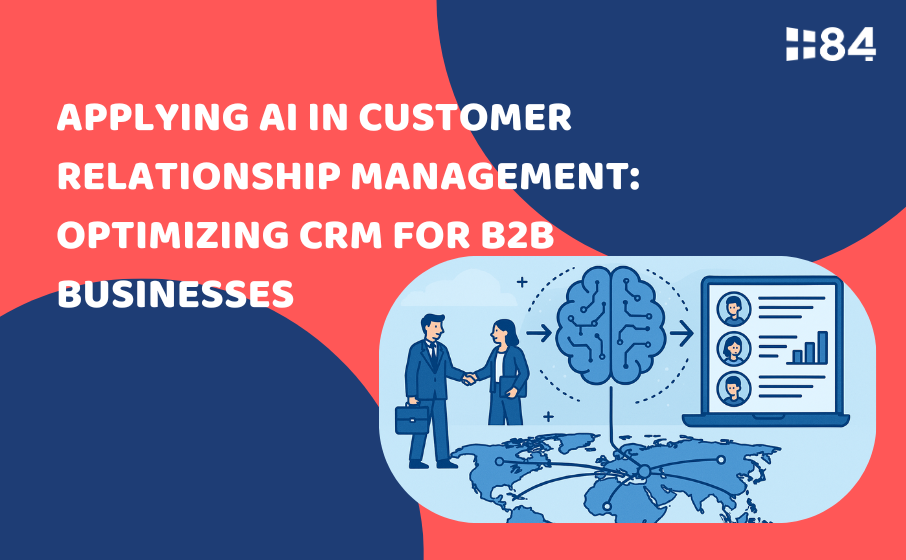In today’s business landscape, Customer Relationship Management (CRM) plays a pivotal role that every enterprise must prioritize. Effective customer data management not only helps maintain long-term relationships but also drives robust business growth. For B2B enterprises in particular, customer segmentation, trend forecasting, and optimizing customer engagement strategies are essential to boosting business performance.
With rapid technological advancements, Artificial Intelligence (AI) has emerged as a powerful ally for B2B companies in executing CRM tasks. AI enables businesses to automatically and accurately segment customers while predicting future behaviors. This empowers businesses to refine their engagement strategies and achieve more effective revenue growth.
CRM isn’t just about maintaining relationships—it’s a critical tool for enhancing marketing and sales strategies. However, the growing volume and complexity of customer data presents challenges for B2B companies in terms of processing and analysis. AI provides an effective solution, offering capabilities in customer segmentation, trend prediction, and engagement optimization—delivering substantial benefits for the overall CRM process.
AI in customer segmentation
Customer segmentation is the first and most crucial step in building an effective CRM strategy. Traditionally, this task was handled manually, requiring businesses to analyze customer data painstakingly using basic tools. This method was not only time-consuming but also prone to errors. Thanks to AI, customer segmentation is now significantly faster and more accurate.
AI can automatically analyze customer behavior data.

For example, it can evaluate how often customers make purchases, the value of their orders, their interaction time with the website, emails, or other marketing channels. Based on these insights, AI can categorize customers into specific groups—such as “potential customers” who show high purchasing intent, “loyal customers” who buy frequently, or “at-risk customers” who rarely interact or show signs of disengagement.
The use of AI in customer segmentation brings several major benefits:
-
Increased accuracy: AI processes massive datasets quickly and precisely, leading to clearer customer classifications than manual methods.
-
Time savings: Automating data analysis frees up time for teams to focus on higher-level strategic tasks.
-
Personalized engagement strategies: AI helps businesses craft tailored engagement strategies for different customer groups, enhancing the effectiveness of marketing and sales campaigns.
By leveraging AI, businesses can gain deeper insights into individual customers and create more suitable strategies, ultimately strengthening relationships and driving long-term growth.
AI in predicting customer trends
One of AI’s most powerful capabilities in CRM is its ability to forecast future customer trends and needs. But how does it do this? AI analyzes historical data collected by the business—such as shopping behavior, preferences, and consumption habits—to predict what customers may need going forward. This helps companies better understand their customers and prepare targeted marketing and sales strategies.
For example, if a customer has repeatedly searched for a specific product without making a purchase, AI can identify this pattern and predict that the customer may soon convert. Or, if a customer frequently encounters issues with a product, AI can recognize the need for support services. These insights allow businesses to proactively reach out with suitable products or services, increasing the likelihood of successful engagement.
Key benefits of AI in customer trend prediction include:
-
Reduced marketing costs: Instead of casting a wide net, businesses can focus on high-potential leads, saving on advertising expenses and boosting efficiency.
-
Improved customer experience: By accurately anticipating customer needs, companies can deliver relevant products and services, enhancing satisfaction and brand loyalty.
In essence, AI not only helps reduce costs but also strengthens customer relationships—ultimately driving business success.
AI for more effective customer engagement
AI doesn’t just help businesses understand who their customers are or what they’re interested in—it also helps craft more effective ways to engage with them. In other words, AI plays a vital role in improving how companies communicate with customers.

Today, many AI tools can autonomously handle tasks within the customer data management process. For example, AI can automatically send marketing emails at the right time, generate personalized content, or respond to inquiries via live chat channels like websites or social media platforms.
Beyond automation, AI also learns from past marketing campaigns. It analyzes what worked, the optimal timing for emails, the content types that engaged customers the most, and which strategies influenced purchasing decisions. Based on these insights, AI provides actionable recommendations to adjust future outreach strategies.
Benefits of using AI to optimize customer engagement include:
-
Time and cost efficiency: By automating routine tasks, marketing teams can allocate more resources to strategic planning.
-
Increased marketing effectiveness: AI-driven personalization helps customers feel understood, making them more likely to convert—ultimately boosting sales and revenue.
Challenges and considerations in applying AI to CRM
While AI greatly enhances customer data management, implementing it comes with certain challenges. Here are two critical considerations for businesses:
-
Data security and privacy: As AI collects and analyzes customer data, companies must ensure this information is safeguarded from breaches or misuse. If customer data is compromised, trust in the brand can be severely damaged. Therefore, businesses must comply with strict data protection regulations and invest in secure information systems.
-
Talent and technological updates: AI systems require skilled professionals to monitor and fine-tune them. Without competent staff, AI could generate inaccurate predictions that negatively impact business strategy. Additionally, AI technology is constantly evolving, necessitating ongoing updates and optimization to remain effective. Outdated AI systems risk becoming inefficient and irrelevant.
To fully leverage AI in CRM, businesses must prioritize both data security and investments in human capital and technology.
Conclusion
Artificial Intelligence is rapidly becoming an indispensable tool in Customer Relationship Management for B2B enterprises. It enables precise customer segmentation, future trend prediction, and optimized engagement strategies—enhancing overall business effectiveness. However, companies must also address data privacy concerns and invest in skilled personnel to harness AI’s full potential.
When implemented correctly, AI can significantly elevate customer management, create exceptional customer experiences, and support long-term sustainable growth for B2B businesses.


